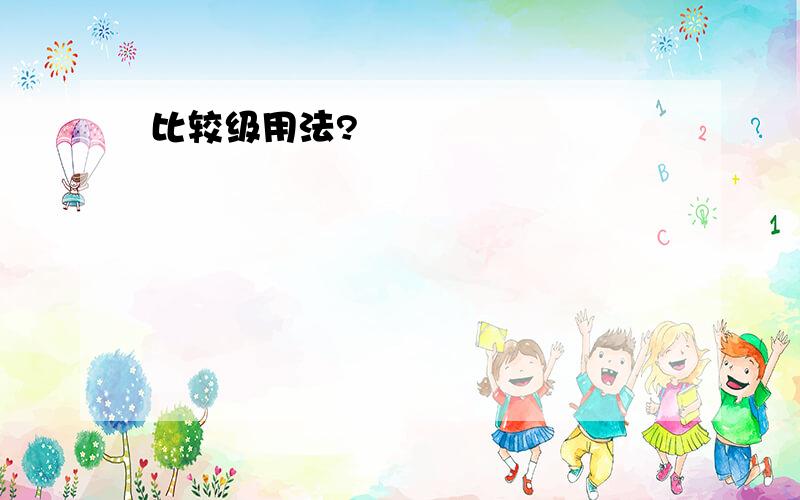比较级用法?
来源:学生作业帮助网 编辑:作业帮 时间:2024/11/19 08:34:20

比较级用法?
比较级用法?
比较级用法?
比较级的用法
I am older than you.
我比你大.
1.句型:A+动词+形容词比较级+than + B.
二者相比较,说明“A比B更……一些”时要用一个连词than引导的从句.
Mary is happier than Jane.
玛丽比珍妮幸福.
His brother is younger than I (me).
他哥哥比我小.
注意
than后面接代词时,一般要用主格.但在口语中也可使用宾格.
Beijing is more beautiful than Wuhan.
北京比武汉美丽.
You look younger today.
今天你看起来比较年轻.(省略了than before)
注意
than是一个连词,它连接一个状语从句来表示和什么相比,因此than一般都译为“比”,通常,为了避免重复,从句中有些成分可以省略,而把相比的部分突出来.有时,如果比较的对象显而易见时,往往会将than从句省略.
完整句子:
You look younger today than you looked(young)before.
(这样的句子只是帮助理解,实际应用中,不能出现)
Are you feeling better?
你现在感觉好些了吗?
4 需注意的比较级用法
Your room is much larger than mine.
你的房间比我的大多了.
Your room is three times larger than mine.
你的房间比我的大三倍.
He is taller than any other boy in his class.
在班上,他比任何一个男孩子都高.
1.在形容词比较级前还可以用much, even, still, a little,……来修饰,表示“……的多”,“甚至……”,“更……”,“……一些”.
Our city is much more beautiful than yours.
我们的城市比你们的漂亮得多.
This is even harder than steel.
这个东西甚至比钢还硬.
He is even slower than before.
他比以前更慢了.
Japan is a little larger than Germany.
日本只比德国大一点儿.
2.表示倍数:…times+形容词比较级+than…
Our room is twice larger than theirs.
我们的房间比他们的大二倍.
The Yangzi River is ten times longer than the river in your city.
长江比你们城市的河长十倍.
3.表示“大三岁”,“高二厘米”时要用《表示数、量的词+比较级》来表示.
I'm two years older than you.
我比你大二岁.
She is a head taller than I(me).
她比我高一个头.
4.《比较级+ than any other +单数名词》表示“比其他的任何……都……”
(这个句型是用比较级形式表达最高级的意思.)
He is better than any other student in the class.
他在班里,比任何一个别的学生都好.
(暗指:他是最好的)
注意
any other后要加单数名词,如果译成“任何一个别的”似乎好理解它为什么接单数名词.
This watch is more expensive than any other watch in the shop.
在这个店里,这只表比其他任何一个别的表都贵.(这只表是最贵的)
5.《比较级+and+比较级》译为“越来越……”
The earth is getting warmer and warmer.
地球变得越来越暖和.
China is more and more beautiful.
中国变得越来越美丽
注意
多音节形容词用此句型时,要用more and more +形容词原级;而不能用more beautiful and more beautiful.
6.《the+比较级…,the+比较级…》译为“越……就越……”
The busier he is, the happier he feels.
他越忙就越高兴.
The higher the ground(is),the thinner air becomes.
越高,空气就越稀薄.
7.《the+比较级+ of the two》译为“两个中比较……的”.
This watch is the cheaper of the two.
这支手表是两个中比较便宜的.
He is the better of the two.
他是这两个人中比较好的.
8.Which(Who)is+比较级…?
比较A和B,问“哪一个较……?”时用《Which is+比较级,A or B?》句型.如果是人与人相比时,用Who代替Which.
Which one is more popular, the radio or the movie? 收音机和电影,哪一个更普及?
The radio is.收音机.
注意
A or B,只能用or不能用and.
Who is happier, you or your father?
你和你父亲,谁幸福?
I am.我
(或者) My father is. 我父亲.